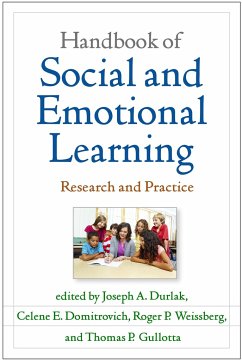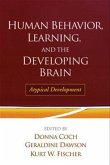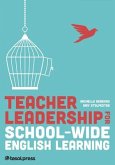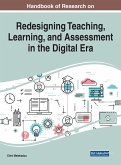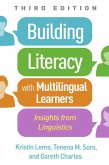Handbook of Social and Emotional Learning, First Edition
Research and Practice
Herausgeber: Domitrovich, Celene E.; Gullotta, Thomas P.; Weissberg, Roger P.; Durlak, Joseph A.
Handbook of Social and Emotional Learning, First Edition
Research and Practice
Herausgeber: Domitrovich, Celene E.; Gullotta, Thomas P.; Weissberg, Roger P.; Durlak, Joseph A.
- Broschiertes Buch
- Merkliste
- Auf die Merkliste
- Bewerten Bewerten
- Teilen
- Produkt teilen
- Produkterinnerung
- Produkterinnerung
The burgeoning multidisciplinary field of social and emotional learning (SEL) now has a comprehensive and definitive handbook covering all aspects of research, practice, and policy. The prominent editors and contributors describe state-of-the-art intervention and prevention programs designed to build students&
Andere Kunden interessierten sich auch für
![Essentials for Blended Learning, 2nd Edition Essentials for Blended Learning, 2nd Edition]() Jared SteinEssentials for Blended Learning, 2nd Edition36,99 €
Jared SteinEssentials for Blended Learning, 2nd Edition36,99 €![Human Behavior, Learning, and the Developing Brain Human Behavior, Learning, and the Developing Brain]() Human Behavior, Learning, and the Developing Brain88,99 €
Human Behavior, Learning, and the Developing Brain88,99 €![Literature, Learning, and Social Hierarchy in Early Modern Europe Literature, Learning, and Social Hierarchy in Early Modern Europe]() Literature, Learning, and Social Hierarchy in Early Modern Europe119,99 €
Literature, Learning, and Social Hierarchy in Early Modern Europe119,99 €![Teacher Leadership for School-Wide English Learning, First Edition Teacher Leadership for School-Wide English Learning, First Edition]() Michelle BenegasTeacher Leadership for School-Wide English Learning, First Edition36,99 €
Michelle BenegasTeacher Leadership for School-Wide English Learning, First Edition36,99 €![Handbook of Research on Redesigning Teaching, Learning, and Assessment in the Digital Era Handbook of Research on Redesigning Teaching, Learning, and Assessment in the Digital Era]() Handbook of Research on Redesigning Teaching, Learning, and Assessment in the Digital Era293,99 €
Handbook of Research on Redesigning Teaching, Learning, and Assessment in the Digital Era293,99 €![Evaluative Practice in Learning, Design, and Technology Evaluative Practice in Learning, Design, and Technology]() Lauren M. BagdyEvaluative Practice in Learning, Design, and Technology54,99 €
Lauren M. BagdyEvaluative Practice in Learning, Design, and Technology54,99 €![Building Literacy with Multilingual Learners, Third Edition Building Literacy with Multilingual Learners, Third Edition]() Kristin Lems (United States National Louis University)Building Literacy with Multilingual Learners, Third Edition81,99 €
Kristin Lems (United States National Louis University)Building Literacy with Multilingual Learners, Third Edition81,99 €-
-
-
The burgeoning multidisciplinary field of social and emotional learning (SEL) now has a comprehensive and definitive handbook covering all aspects of research, practice, and policy. The prominent editors and contributors describe state-of-the-art intervention and prevention programs designed to build students&
Hinweis: Dieser Artikel kann nur an eine deutsche Lieferadresse ausgeliefert werden.
Hinweis: Dieser Artikel kann nur an eine deutsche Lieferadresse ausgeliefert werden.
Produktdetails
- Produktdetails
- Verlag: Guilford Publications
- Seitenzahl: 634
- Erscheinungstermin: 18. November 2016
- Englisch
- Abmessung: 254mm x 179mm x 32mm
- Gewicht: 1114g
- ISBN-13: 9781462527915
- ISBN-10: 1462527914
- Artikelnr.: 45516316
- Herstellerkennzeichnung
- Libri GmbH
- Europaallee 1
- 36244 Bad Hersfeld
- gpsr@libri.de
- Verlag: Guilford Publications
- Seitenzahl: 634
- Erscheinungstermin: 18. November 2016
- Englisch
- Abmessung: 254mm x 179mm x 32mm
- Gewicht: 1114g
- ISBN-13: 9781462527915
- ISBN-10: 1462527914
- Artikelnr.: 45516316
- Herstellerkennzeichnung
- Libri GmbH
- Europaallee 1
- 36244 Bad Hersfeld
- gpsr@libri.de
Joseph A. Durlak, PhD, is Emeritus Professor of Psychology at Loyola University Chicago. He has been a member of the editorial boards of several professional publications, has written or coedited four books on prevention, and has a longstanding interest in the welfare of children and adolescents. Dr. Durlak's current work focuses on how to facilitate the implementation of evidence-based SEL and prevention programs in local communities and schools. He is a recipient of the Joseph E. Zins Award for Action Research in SEL from the Collaborative for Academic, Social, and Emotional Learning (CASEL). Celene E. Domitrovich, PhD, is Associate Professor in the Center for Child and Human Development at Georgetown University. She is also a Senior Research Scientist at the Collaborative for Academic, Social, and Emotional Learning (CASEL) and has academic affiliations with The University of Illinois at Chicago, The Pennsylvania State University, and Johns Hopkins University. Her research and publications focus on the development of social and emotional competence in children, the role of teachers in children's acquisition of these skills, and how these skills are related to success in school. Dr. Domitrovich is the developer of the Preschool PATHS Curriculum. She has served on the board of the Society for Prevention Research and is a recipient of the Joseph E. Zins Award for Action Research in SEL from CASEL. Roger P. Weissberg, PhD, is NoVo Foundation Endowed Chair in SEL and Distinguished Professor of Psychology and Education at The University of Illinois at Chicago. He is also Chief Knowledge Officer of the Collaborative for Academic, Social, and Emotional Learning.Dr. Weissberg has authored numerous publications on preventive interventions with children. He has received awards including the Distinguished Contribution Award for Applications of Psychology to Education and Training from the American Psychological Association, the Distinguished Contribution to Theory and Research Award from the Society for Community Research and Action, and the Daring Dozen Award from the George Lucas Educational Foundation. He is an elected member of the National Academy of Education. Thomas P. Gullotta, MA, MSW, is CEO of the Child and Family Agency of Southeastern Connecticut, Inc., and a member of the Departments of Psychology and Education at Eastern Connecticut State University. He is editor emeritus of the Journal of Primary Prevention and serves on the editorial boards of the Journal of Early Adolescence, Journal of Adolescent Research, and Journal of Educational and Psychological Consultation. He has published extensively on adolescents and primary prevention. Mr. Gullotta is a recipient of the Distinguished Contributions to Practice in Community Psychology Award from the Society for Community Research and Action, Division 27 of the American Psychological Association.
Introduction: The Uncommon Core
Timothy Shriver & Jennifer Buffett I. Foundations 1. Social and Emotional Learning: Past
Present
and Future
Roger P. Weissberg
Joseph A. Durlak
Celene E. Domitrovich
& Thomas P. Gullotta 2. Applying Theory to the Development of Approaches to SEL
Marc A. Brackett
Nicole A. Elbertson
& Susan E. Rivers 3. Integrating SEL with Related Prevention and Youth Development Approaches
Maurice J. Elias
Larry Leverett
Joan Cole Duffell
Neil Humphrey
Cesalie Stepney
& Joseph Ferrito 4. Culture and Social and Emotional Competencies
Michael L. Hecht & YoungJu Shin 5. The Neuroscience of SEL
Clancy Blair & C. Cybele Raver 6. The Potential Effects of SEL on Biomarkers and Health Outcomes: A Promissory Note
Mark T. Greenberg
Deirdre A. Katz
& Laura Cousino Klein 7. The Economic Case for SEL
Damon Jones
Mark T. Greenberg
& Max Crowley 8. Financing and Funding for SEL Initiatives
Olga Acosta Price II. Evidence-Based Programming 9. SEL Programs for Preschool Children
Karen L. Bierman & Mojdeh Motamedi 10. SEL in Elementary School Settings: Identifying Mechanisms that Matter
Sara E. Rimm-Kaufman & Chris S. Hulleman 11. A Review of Classroom-Based SEL Programs at the Middle School Level
Robert J. Jagers
Alexis Harris
& Alexandra Skoog 12. SEL Programs in High School
Ariel A. Williamson
Kathryn L. Modecki
& Nancy G. Guerra 13. SEL in Higher Education
Colleen S. Conley 14. SEL for Students with High-Incidence Disabilities
Andrew L. Wiley & Gary N. Siperstein 15. SEL and Student-Teacher Relationships
Amanda P. Williford & Catherine Sanger Wolcott 16. The Role of School-Family Partnership Programs for Promoting Student SEL
S. Andrew Garbacz
Michelle S. Swanger-Gagné
& Susan M. Sheridan 17. After-School Programming and SEL
Thomas P. Gullotta 18. SEL Programs for Juvenile Justice Settings and Populations
Patrick H. Tolan
Emily Nichols
& Nicole DuVal III. Assessment 19. Assessment of SEL in Educational Contexts
Susanne A. Denham 20. Systems for Assessing and Improving Students' Social Skills to Achieve Academic Competence
Stephen N. Elliott
Jennifer R. Frey
& Michael Davies 21. Challenges and Opportunities in the Direct Assessment of Children's Social and Emotional Comprehension
Clark McKown 22. Using Formative Assessment with SEL Skills
Robert J. Marzano 23. Assessment of Climate and Conditions for Learning
Mark Garibaldi
Sally Ruddy
Kimberly Kendziora
& David Osher 24. Assessing Organizational Readiness
Shannon B. Wanless
Christine J. Groark
& Bridget E. Hatfield 25. Indicators of Effective SEL Practice
Sam Redding & Herbert J. Walberg IV. Toward Widespread Practice and Policy 26. What Everyone Should Know About Implementation
Joseph A. Durlak 27. SEL and Preservice Teacher Education
Kimberly A. Schonert-Reichl
Jennifer L. Hanson-Peterson
& Shelley Hymel 28. Inservice Preparation for Educators
Patricia A. Jennings & Jennifer L. Frank 29. Developing Socially
Emotionally
and Cognitively Competent School Leaders and Learning Communities
Janet Patti
Peter Senge
Claudia Madrazo
and Robin S. Stern 30. SEL and Schoolwide Positive Behavioral Interventions and Supports
George G. Bear
Sara A. Whitcomb
Maurice J. Elias
& Jessica C. Blank 31. Taking SEL to Scale in Schools: The Role of Community Coalitions
Abigail A. Fagan
J. David Hawkins
& Valerie B. Shapiro 32. Systemic Support for SEL in School Districts
Amy Kathryn Mart
Roger P. Weissberg
& Kimberly Kendziora 33. Accountability and SEL Programs: The Getting To Outcomes® Approach
Annie Wright
Andrea Lamont
Abraham Wandersman
David Osher
& Eric S. Gordon 34. Current and Potential Uses of Technology to Enhance SEL: What's Now and What's Next?
Robin S. Stern
Tucker B. Harding
Allison A. Holzer
& Nicole A. Elbertson 35. The Case for Preschool through High School State Learning Standards for SEL
Linda A. Dusenbury
Jessy Zadrazil Newman
Roger P. Weissberg
Paul Goren
Celene E. Domitrovich
& Amy Kathryn Mart 36. Federal Policy Initiatives and Children's SEL
Martha Zaslow
Bonnie Mackintosh
Sarah Mancoll
& Sarah Mandell 37. International Perspectives on SEL
Catalina Torrente
Anjali Alimchandani
& J. Lawrence Aber Afterword: Making SEL Work for All Children
James Comer Afterword: The Future of Social and Emotional Learning
Daniel Goleman
Timothy Shriver & Jennifer Buffett I. Foundations 1. Social and Emotional Learning: Past
Present
and Future
Roger P. Weissberg
Joseph A. Durlak
Celene E. Domitrovich
& Thomas P. Gullotta 2. Applying Theory to the Development of Approaches to SEL
Marc A. Brackett
Nicole A. Elbertson
& Susan E. Rivers 3. Integrating SEL with Related Prevention and Youth Development Approaches
Maurice J. Elias
Larry Leverett
Joan Cole Duffell
Neil Humphrey
Cesalie Stepney
& Joseph Ferrito 4. Culture and Social and Emotional Competencies
Michael L. Hecht & YoungJu Shin 5. The Neuroscience of SEL
Clancy Blair & C. Cybele Raver 6. The Potential Effects of SEL on Biomarkers and Health Outcomes: A Promissory Note
Mark T. Greenberg
Deirdre A. Katz
& Laura Cousino Klein 7. The Economic Case for SEL
Damon Jones
Mark T. Greenberg
& Max Crowley 8. Financing and Funding for SEL Initiatives
Olga Acosta Price II. Evidence-Based Programming 9. SEL Programs for Preschool Children
Karen L. Bierman & Mojdeh Motamedi 10. SEL in Elementary School Settings: Identifying Mechanisms that Matter
Sara E. Rimm-Kaufman & Chris S. Hulleman 11. A Review of Classroom-Based SEL Programs at the Middle School Level
Robert J. Jagers
Alexis Harris
& Alexandra Skoog 12. SEL Programs in High School
Ariel A. Williamson
Kathryn L. Modecki
& Nancy G. Guerra 13. SEL in Higher Education
Colleen S. Conley 14. SEL for Students with High-Incidence Disabilities
Andrew L. Wiley & Gary N. Siperstein 15. SEL and Student-Teacher Relationships
Amanda P. Williford & Catherine Sanger Wolcott 16. The Role of School-Family Partnership Programs for Promoting Student SEL
S. Andrew Garbacz
Michelle S. Swanger-Gagné
& Susan M. Sheridan 17. After-School Programming and SEL
Thomas P. Gullotta 18. SEL Programs for Juvenile Justice Settings and Populations
Patrick H. Tolan
Emily Nichols
& Nicole DuVal III. Assessment 19. Assessment of SEL in Educational Contexts
Susanne A. Denham 20. Systems for Assessing and Improving Students' Social Skills to Achieve Academic Competence
Stephen N. Elliott
Jennifer R. Frey
& Michael Davies 21. Challenges and Opportunities in the Direct Assessment of Children's Social and Emotional Comprehension
Clark McKown 22. Using Formative Assessment with SEL Skills
Robert J. Marzano 23. Assessment of Climate and Conditions for Learning
Mark Garibaldi
Sally Ruddy
Kimberly Kendziora
& David Osher 24. Assessing Organizational Readiness
Shannon B. Wanless
Christine J. Groark
& Bridget E. Hatfield 25. Indicators of Effective SEL Practice
Sam Redding & Herbert J. Walberg IV. Toward Widespread Practice and Policy 26. What Everyone Should Know About Implementation
Joseph A. Durlak 27. SEL and Preservice Teacher Education
Kimberly A. Schonert-Reichl
Jennifer L. Hanson-Peterson
& Shelley Hymel 28. Inservice Preparation for Educators
Patricia A. Jennings & Jennifer L. Frank 29. Developing Socially
Emotionally
and Cognitively Competent School Leaders and Learning Communities
Janet Patti
Peter Senge
Claudia Madrazo
and Robin S. Stern 30. SEL and Schoolwide Positive Behavioral Interventions and Supports
George G. Bear
Sara A. Whitcomb
Maurice J. Elias
& Jessica C. Blank 31. Taking SEL to Scale in Schools: The Role of Community Coalitions
Abigail A. Fagan
J. David Hawkins
& Valerie B. Shapiro 32. Systemic Support for SEL in School Districts
Amy Kathryn Mart
Roger P. Weissberg
& Kimberly Kendziora 33. Accountability and SEL Programs: The Getting To Outcomes® Approach
Annie Wright
Andrea Lamont
Abraham Wandersman
David Osher
& Eric S. Gordon 34. Current and Potential Uses of Technology to Enhance SEL: What's Now and What's Next?
Robin S. Stern
Tucker B. Harding
Allison A. Holzer
& Nicole A. Elbertson 35. The Case for Preschool through High School State Learning Standards for SEL
Linda A. Dusenbury
Jessy Zadrazil Newman
Roger P. Weissberg
Paul Goren
Celene E. Domitrovich
& Amy Kathryn Mart 36. Federal Policy Initiatives and Children's SEL
Martha Zaslow
Bonnie Mackintosh
Sarah Mancoll
& Sarah Mandell 37. International Perspectives on SEL
Catalina Torrente
Anjali Alimchandani
& J. Lawrence Aber Afterword: Making SEL Work for All Children
James Comer Afterword: The Future of Social and Emotional Learning
Daniel Goleman
Introduction: The Uncommon Core
Timothy Shriver & Jennifer Buffett I. Foundations 1. Social and Emotional Learning: Past
Present
and Future
Roger P. Weissberg
Joseph A. Durlak
Celene E. Domitrovich
& Thomas P. Gullotta 2. Applying Theory to the Development of Approaches to SEL
Marc A. Brackett
Nicole A. Elbertson
& Susan E. Rivers 3. Integrating SEL with Related Prevention and Youth Development Approaches
Maurice J. Elias
Larry Leverett
Joan Cole Duffell
Neil Humphrey
Cesalie Stepney
& Joseph Ferrito 4. Culture and Social and Emotional Competencies
Michael L. Hecht & YoungJu Shin 5. The Neuroscience of SEL
Clancy Blair & C. Cybele Raver 6. The Potential Effects of SEL on Biomarkers and Health Outcomes: A Promissory Note
Mark T. Greenberg
Deirdre A. Katz
& Laura Cousino Klein 7. The Economic Case for SEL
Damon Jones
Mark T. Greenberg
& Max Crowley 8. Financing and Funding for SEL Initiatives
Olga Acosta Price II. Evidence-Based Programming 9. SEL Programs for Preschool Children
Karen L. Bierman & Mojdeh Motamedi 10. SEL in Elementary School Settings: Identifying Mechanisms that Matter
Sara E. Rimm-Kaufman & Chris S. Hulleman 11. A Review of Classroom-Based SEL Programs at the Middle School Level
Robert J. Jagers
Alexis Harris
& Alexandra Skoog 12. SEL Programs in High School
Ariel A. Williamson
Kathryn L. Modecki
& Nancy G. Guerra 13. SEL in Higher Education
Colleen S. Conley 14. SEL for Students with High-Incidence Disabilities
Andrew L. Wiley & Gary N. Siperstein 15. SEL and Student-Teacher Relationships
Amanda P. Williford & Catherine Sanger Wolcott 16. The Role of School-Family Partnership Programs for Promoting Student SEL
S. Andrew Garbacz
Michelle S. Swanger-Gagné
& Susan M. Sheridan 17. After-School Programming and SEL
Thomas P. Gullotta 18. SEL Programs for Juvenile Justice Settings and Populations
Patrick H. Tolan
Emily Nichols
& Nicole DuVal III. Assessment 19. Assessment of SEL in Educational Contexts
Susanne A. Denham 20. Systems for Assessing and Improving Students' Social Skills to Achieve Academic Competence
Stephen N. Elliott
Jennifer R. Frey
& Michael Davies 21. Challenges and Opportunities in the Direct Assessment of Children's Social and Emotional Comprehension
Clark McKown 22. Using Formative Assessment with SEL Skills
Robert J. Marzano 23. Assessment of Climate and Conditions for Learning
Mark Garibaldi
Sally Ruddy
Kimberly Kendziora
& David Osher 24. Assessing Organizational Readiness
Shannon B. Wanless
Christine J. Groark
& Bridget E. Hatfield 25. Indicators of Effective SEL Practice
Sam Redding & Herbert J. Walberg IV. Toward Widespread Practice and Policy 26. What Everyone Should Know About Implementation
Joseph A. Durlak 27. SEL and Preservice Teacher Education
Kimberly A. Schonert-Reichl
Jennifer L. Hanson-Peterson
& Shelley Hymel 28. Inservice Preparation for Educators
Patricia A. Jennings & Jennifer L. Frank 29. Developing Socially
Emotionally
and Cognitively Competent School Leaders and Learning Communities
Janet Patti
Peter Senge
Claudia Madrazo
and Robin S. Stern 30. SEL and Schoolwide Positive Behavioral Interventions and Supports
George G. Bear
Sara A. Whitcomb
Maurice J. Elias
& Jessica C. Blank 31. Taking SEL to Scale in Schools: The Role of Community Coalitions
Abigail A. Fagan
J. David Hawkins
& Valerie B. Shapiro 32. Systemic Support for SEL in School Districts
Amy Kathryn Mart
Roger P. Weissberg
& Kimberly Kendziora 33. Accountability and SEL Programs: The Getting To Outcomes® Approach
Annie Wright
Andrea Lamont
Abraham Wandersman
David Osher
& Eric S. Gordon 34. Current and Potential Uses of Technology to Enhance SEL: What's Now and What's Next?
Robin S. Stern
Tucker B. Harding
Allison A. Holzer
& Nicole A. Elbertson 35. The Case for Preschool through High School State Learning Standards for SEL
Linda A. Dusenbury
Jessy Zadrazil Newman
Roger P. Weissberg
Paul Goren
Celene E. Domitrovich
& Amy Kathryn Mart 36. Federal Policy Initiatives and Children's SEL
Martha Zaslow
Bonnie Mackintosh
Sarah Mancoll
& Sarah Mandell 37. International Perspectives on SEL
Catalina Torrente
Anjali Alimchandani
& J. Lawrence Aber Afterword: Making SEL Work for All Children
James Comer Afterword: The Future of Social and Emotional Learning
Daniel Goleman
Timothy Shriver & Jennifer Buffett I. Foundations 1. Social and Emotional Learning: Past
Present
and Future
Roger P. Weissberg
Joseph A. Durlak
Celene E. Domitrovich
& Thomas P. Gullotta 2. Applying Theory to the Development of Approaches to SEL
Marc A. Brackett
Nicole A. Elbertson
& Susan E. Rivers 3. Integrating SEL with Related Prevention and Youth Development Approaches
Maurice J. Elias
Larry Leverett
Joan Cole Duffell
Neil Humphrey
Cesalie Stepney
& Joseph Ferrito 4. Culture and Social and Emotional Competencies
Michael L. Hecht & YoungJu Shin 5. The Neuroscience of SEL
Clancy Blair & C. Cybele Raver 6. The Potential Effects of SEL on Biomarkers and Health Outcomes: A Promissory Note
Mark T. Greenberg
Deirdre A. Katz
& Laura Cousino Klein 7. The Economic Case for SEL
Damon Jones
Mark T. Greenberg
& Max Crowley 8. Financing and Funding for SEL Initiatives
Olga Acosta Price II. Evidence-Based Programming 9. SEL Programs for Preschool Children
Karen L. Bierman & Mojdeh Motamedi 10. SEL in Elementary School Settings: Identifying Mechanisms that Matter
Sara E. Rimm-Kaufman & Chris S. Hulleman 11. A Review of Classroom-Based SEL Programs at the Middle School Level
Robert J. Jagers
Alexis Harris
& Alexandra Skoog 12. SEL Programs in High School
Ariel A. Williamson
Kathryn L. Modecki
& Nancy G. Guerra 13. SEL in Higher Education
Colleen S. Conley 14. SEL for Students with High-Incidence Disabilities
Andrew L. Wiley & Gary N. Siperstein 15. SEL and Student-Teacher Relationships
Amanda P. Williford & Catherine Sanger Wolcott 16. The Role of School-Family Partnership Programs for Promoting Student SEL
S. Andrew Garbacz
Michelle S. Swanger-Gagné
& Susan M. Sheridan 17. After-School Programming and SEL
Thomas P. Gullotta 18. SEL Programs for Juvenile Justice Settings and Populations
Patrick H. Tolan
Emily Nichols
& Nicole DuVal III. Assessment 19. Assessment of SEL in Educational Contexts
Susanne A. Denham 20. Systems for Assessing and Improving Students' Social Skills to Achieve Academic Competence
Stephen N. Elliott
Jennifer R. Frey
& Michael Davies 21. Challenges and Opportunities in the Direct Assessment of Children's Social and Emotional Comprehension
Clark McKown 22. Using Formative Assessment with SEL Skills
Robert J. Marzano 23. Assessment of Climate and Conditions for Learning
Mark Garibaldi
Sally Ruddy
Kimberly Kendziora
& David Osher 24. Assessing Organizational Readiness
Shannon B. Wanless
Christine J. Groark
& Bridget E. Hatfield 25. Indicators of Effective SEL Practice
Sam Redding & Herbert J. Walberg IV. Toward Widespread Practice and Policy 26. What Everyone Should Know About Implementation
Joseph A. Durlak 27. SEL and Preservice Teacher Education
Kimberly A. Schonert-Reichl
Jennifer L. Hanson-Peterson
& Shelley Hymel 28. Inservice Preparation for Educators
Patricia A. Jennings & Jennifer L. Frank 29. Developing Socially
Emotionally
and Cognitively Competent School Leaders and Learning Communities
Janet Patti
Peter Senge
Claudia Madrazo
and Robin S. Stern 30. SEL and Schoolwide Positive Behavioral Interventions and Supports
George G. Bear
Sara A. Whitcomb
Maurice J. Elias
& Jessica C. Blank 31. Taking SEL to Scale in Schools: The Role of Community Coalitions
Abigail A. Fagan
J. David Hawkins
& Valerie B. Shapiro 32. Systemic Support for SEL in School Districts
Amy Kathryn Mart
Roger P. Weissberg
& Kimberly Kendziora 33. Accountability and SEL Programs: The Getting To Outcomes® Approach
Annie Wright
Andrea Lamont
Abraham Wandersman
David Osher
& Eric S. Gordon 34. Current and Potential Uses of Technology to Enhance SEL: What's Now and What's Next?
Robin S. Stern
Tucker B. Harding
Allison A. Holzer
& Nicole A. Elbertson 35. The Case for Preschool through High School State Learning Standards for SEL
Linda A. Dusenbury
Jessy Zadrazil Newman
Roger P. Weissberg
Paul Goren
Celene E. Domitrovich
& Amy Kathryn Mart 36. Federal Policy Initiatives and Children's SEL
Martha Zaslow
Bonnie Mackintosh
Sarah Mancoll
& Sarah Mandell 37. International Perspectives on SEL
Catalina Torrente
Anjali Alimchandani
& J. Lawrence Aber Afterword: Making SEL Work for All Children
James Comer Afterword: The Future of Social and Emotional Learning
Daniel Goleman

